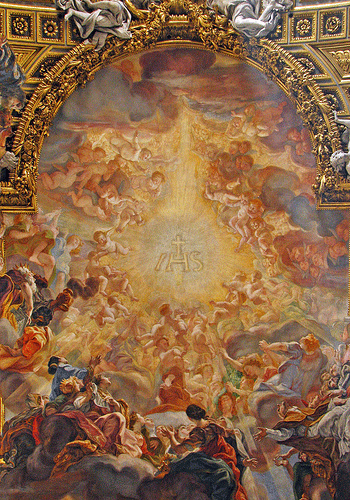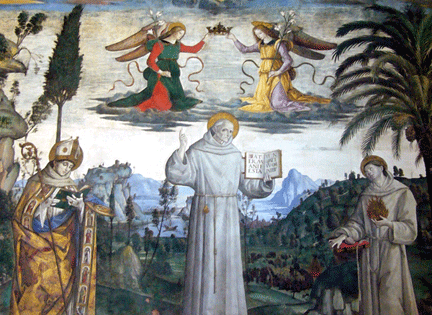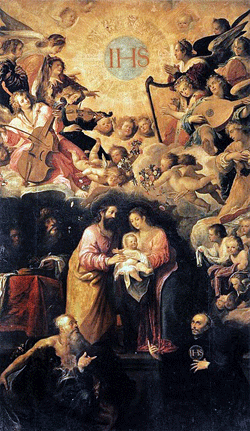The Traditional Catholic Liturgy
Adapted from The Liturgical Year by Abbot Gueranger
Feast of the Most Holy Name of Jesus
 The Second Sunday after the Epiphany, which recalls the Marriage Feast of Cana, was at first chosen as the day on which to honor the Most Holy Name
of Jesus in the universal Church. It is on the Wedding Day that the Bridegroom gives His Name to the Bride, and it is the sign that, from that day
forward, She belongs to Him alone. The Church, therefore, wishing to honor a Name so precious to Her with a special feast, thought it appropriate
to choose the day of the Marriage of Cana. But now She has chosen for the celebration of this august Name, a day closer to the Anniversary on
which It was given—after eight days were accomplished, His Name was called Jesus. She leaves, however, the commemoration of the Sacred Nuptials to
the Sunday of which it has ever been the glory. (In a Motu Proprio dated October 23, 1913, Pope St. Pius X moved this Feast to the Sunday between
January 2-5, or January 2 if none of these days is a Sunday.)
The Second Sunday after the Epiphany, which recalls the Marriage Feast of Cana, was at first chosen as the day on which to honor the Most Holy Name
of Jesus in the universal Church. It is on the Wedding Day that the Bridegroom gives His Name to the Bride, and it is the sign that, from that day
forward, She belongs to Him alone. The Church, therefore, wishing to honor a Name so precious to Her with a special feast, thought it appropriate
to choose the day of the Marriage of Cana. But now She has chosen for the celebration of this august Name, a day closer to the Anniversary on
which It was given—after eight days were accomplished, His Name was called Jesus. She leaves, however, the commemoration of the Sacred Nuptials to
the Sunday of which it has ever been the glory. (In a Motu Proprio dated October 23, 1913, Pope St. Pius X moved this Feast to the Sunday between
January 2-5, or January 2 if none of these days is a Sunday.)
In the Old Covenant, the Name of God inspired fear and awe: nor was the honor of pronouncing it granted to all the children of
Israel. We can understand this. God had not yet come down from Heaven to live on earth, and converse with men; He had not yet taken upon Himself
our poor nature, and become Man like ourselves; the sweet Name expressive of love and tenderness could not yet be applied to Him.
But when the fullness of time had come—when the mystery of love was about to be made known—then did Heaven send down
the Name of Jesus to our earth, as a pledge of the speedy coming of Him Who was to bear it. The Archangel Gabriel said to Mary: Thou shalt call
His Name JESUS. Jesus means Savior. How sweet will this Name not be to poor lost man! It seems to link earth to Heaven! No name is so amiable,
none is so powerful. Every knee in Heaven, on earth, and in Hell, bows in adoration at hearing this Name! And yet, who can pronounce It,
and not feel love spring up within his heart? But we need such a Saint as Bernard, to tell us of the power and sweetness of this Blessed Name.
He thus speaks of It in one of his sermons:
"The Name of Jesus is Light, and Food, and Medicine. It is Light, when it is preached to us; It is Food, when we think upon It;
It is the Medicine that soothes our pains when we invoke It. Let us say a word on each of these. Tell me, whence came there into the whole world
so bright and sudden a light, if not from the preaching of the Name of Jesus? Was it not by the light of this Name that God called us unto His
admirable Light? Wherewith being enlightened, and in this light, seeing the Light, we take these words of St. Paul as truly addressed to ourselves:
Heretofore you were darkness; but now, light in the Lord.
"Nor is the Name of Jesus Light only; it is also Food. Art thou not strengthened, as often as thou thinkest of this Name?
What is there that so feeds the mind of him that meditates upon this Name? What is there that so restores the wearied faculties,
strengthens virtue, gives vigor to good and holy habits, and fosters chastity? Every food of the soul is dry, that is not steeped in this unction;
it is insipid, if it be not seasoned with this salt. If thou write, I relish not thy writing, unless I read there the Name of Jesus.
If thou teach me, or converse with me, I relish not thy words, unless I hear thee say the Name of Jesus. Jesus is honey to the mouth, and music to
the ear, and gladness to the heart.

St. Bernardine with St. Bonaventure and St. John Capistrano.
"It is also Medicine. Is any one among you sad? Let but Jesus come into his heart, and the mouth echo Him, saying Jesus! and lo!
the light of that Name disperses every cloud, and brings sunshine back again. Have any of you committed sin, and is despair driving you into the
snare of death? Invoke the Name of Life, and life will come back to the soul. Was there ever a man that, hearing this saving Name, could keep up
that common fault of hardness of heart, or drowsiness, or sluggishness, or rancor of soul, or languor of sloth? If anyone, perchance, felt that
the fountain of his tears was dry, did it not gush forth more plentifully than ever and flow more sweetly than ever, as soon as he invoked the Name
of Jesus? If any of us were ever in danger, and our heart beat with fear, did not this Name of power bring us confidence and courage the moment we
pronounced it? When we were tossed to and fro by perplexing doubts, did not the evidence of what was right burst on us as we called upon the Name
of Light? When we were discouraged, and well nigh crushed by adversity, did not our heart take courage, when our tongue uttered the Name of Help?
All this is most true; for all these miseries are the sicknesses and faintings of our soul, and the Name of Jesus is our Medicine.
 "But let us see how all this comes to pass. Call upon Me in the day of trouble, says the Lord, I will deliver thee, and thou shalt
glorify Me (Ps. 49: 15). There is nothing which so restrains the impulse of anger, calms the swelling of pride, heals the wounds of envy,
represses the insatiability of luxury, smothers the flame of lust, quenches the thirst of avarice, and dispels the fever of uncleanness—as the Name
of Jesus. For when I pronounce this Name, I bring before my mind the Man, Who, by excellence, is meek and humble of Heart, benign, sober, chaste,
merciful, and filled with everything that is good and holy, nay, Who is the very God Almighty—Whose example heals me, and Whose assistance
strengthens me. I say all this, when I say Jesus. Here I have my Model, for He is Man; and my help, for He is God—the One provides me with
precious medicines, the Other gives them efficacy; and from the two I make a remedy such as no physician knows how to make.
"But let us see how all this comes to pass. Call upon Me in the day of trouble, says the Lord, I will deliver thee, and thou shalt
glorify Me (Ps. 49: 15). There is nothing which so restrains the impulse of anger, calms the swelling of pride, heals the wounds of envy,
represses the insatiability of luxury, smothers the flame of lust, quenches the thirst of avarice, and dispels the fever of uncleanness—as the Name
of Jesus. For when I pronounce this Name, I bring before my mind the Man, Who, by excellence, is meek and humble of Heart, benign, sober, chaste,
merciful, and filled with everything that is good and holy, nay, Who is the very God Almighty—Whose example heals me, and Whose assistance
strengthens me. I say all this, when I say Jesus. Here I have my Model, for He is Man; and my help, for He is God—the One provides me with
precious medicines, the Other gives them efficacy; and from the two I make a remedy such as no physician knows how to make.
"Here is the electuary, my soul, hidden in the casket of this Name Jesus; believe me, it is wholesome, and good for every ailment
thou canst possibly have. Ever have it with thee, in thy bosom and in thy hand; so that all thy affections and actions may be directed to JESUS."
(15th Sermon on the Canticle of Canticles)
The Feast of the Holy Name of Jesus is of comparatively recent origin; its first promoter was St. Bernardine of Siena, who lived in
the 15th century. This holy man established the practice of representing the Holy Name of Jesus surrounded with rays, and formed into a monogram
of its three first Greek letters, I H S. The custom spread rapidly through Italy, and was zealously propagated by the great St. John Capistrano,
who, like St. Bernardine, was of the Order of Friars Minor. The Holy See
gave its formal approbation to this manner of honoring the Name of our
Savior, and in the early part of the 16th century, Pope Clement VI, after long entreaties, granted to the whole Franciscan Order the privilege of
keeping a special Feast in honor of the Most Holy Name of Jesus.
Rome extended the same favor to various churches; and at length, the Feast was inserted into the universal Calendar.
It was in the year 1721, at the request of Charles VI, Emperor of Germany, that Pope Innocent XII decreed that the Feast of the Most Holy Name of
Jesus should be kept throughout the whole Church.
Back to "In this Issue"
Back to Top
Contact us: smr@salvemariaregina.info
Visit also: www.marienfried.com


 The Second Sunday after the Epiphany, which recalls the Marriage Feast of Cana, was at first chosen as the day on which to honor the Most Holy Name
of Jesus in the universal Church. It is on the Wedding Day that the Bridegroom gives His Name to the Bride, and it is the sign that, from that day
forward, She belongs to Him alone. The Church, therefore, wishing to honor a Name so precious to Her with a special feast, thought it appropriate
to choose the day of the Marriage of Cana. But now She has chosen for the celebration of this august Name, a day closer to the Anniversary on
which It was given—after eight days were accomplished, His Name was called Jesus. She leaves, however, the commemoration of the Sacred Nuptials to
the Sunday of which it has ever been the glory. (In a Motu Proprio dated October 23, 1913, Pope St. Pius X moved this Feast to the Sunday between
January 2-5, or January 2 if none of these days is a Sunday.)
The Second Sunday after the Epiphany, which recalls the Marriage Feast of Cana, was at first chosen as the day on which to honor the Most Holy Name
of Jesus in the universal Church. It is on the Wedding Day that the Bridegroom gives His Name to the Bride, and it is the sign that, from that day
forward, She belongs to Him alone. The Church, therefore, wishing to honor a Name so precious to Her with a special feast, thought it appropriate
to choose the day of the Marriage of Cana. But now She has chosen for the celebration of this august Name, a day closer to the Anniversary on
which It was given—after eight days were accomplished, His Name was called Jesus. She leaves, however, the commemoration of the Sacred Nuptials to
the Sunday of which it has ever been the glory. (In a Motu Proprio dated October 23, 1913, Pope St. Pius X moved this Feast to the Sunday between
January 2-5, or January 2 if none of these days is a Sunday.)
 "But let us see how all this comes to pass. Call upon Me in the day of trouble, says the Lord, I will deliver thee, and thou shalt
glorify Me (Ps. 49: 15). There is nothing which so restrains the impulse of anger, calms the swelling of pride, heals the wounds of envy,
represses the insatiability of luxury, smothers the flame of lust, quenches the thirst of avarice, and dispels the fever of uncleanness—as the Name
of Jesus. For when I pronounce this Name, I bring before my mind the Man, Who, by excellence, is meek and humble of Heart, benign, sober, chaste,
merciful, and filled with everything that is good and holy, nay, Who is the very God Almighty—Whose example heals me, and Whose assistance
strengthens me. I say all this, when I say Jesus. Here I have my Model, for He is Man; and my help, for He is God—the One provides me with
precious medicines, the Other gives them efficacy; and from the two I make a remedy such as no physician knows how to make.
"But let us see how all this comes to pass. Call upon Me in the day of trouble, says the Lord, I will deliver thee, and thou shalt
glorify Me (Ps. 49: 15). There is nothing which so restrains the impulse of anger, calms the swelling of pride, heals the wounds of envy,
represses the insatiability of luxury, smothers the flame of lust, quenches the thirst of avarice, and dispels the fever of uncleanness—as the Name
of Jesus. For when I pronounce this Name, I bring before my mind the Man, Who, by excellence, is meek and humble of Heart, benign, sober, chaste,
merciful, and filled with everything that is good and holy, nay, Who is the very God Almighty—Whose example heals me, and Whose assistance
strengthens me. I say all this, when I say Jesus. Here I have my Model, for He is Man; and my help, for He is God—the One provides me with
precious medicines, the Other gives them efficacy; and from the two I make a remedy such as no physician knows how to make.